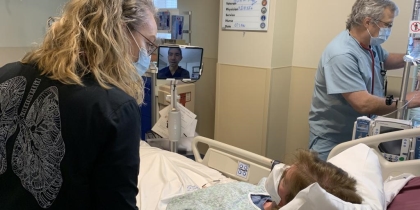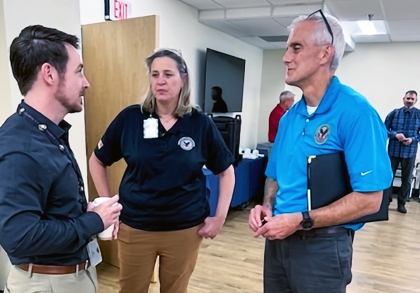The Trump administration’s plan to cut approximately 80,000 employees from VA is receiving pushback from both Republicans and Democrats in Congress.


The Trump administration’s plan to cut approximately 80,000 employees from VA is receiving pushback from both Republicans and Democrats in Congress.

More than a half-century after the United States escalated involvement in the Vietnam War by sending significant combat troops, veterans still face significant psychological and physical health challenges related to their employment.

The current state of combat-casualty readiness in the military health system has degraded to the point where the country is unprepared to care for the casualties that would result from a major conflict, experts told Congress last month.

Sudden cardiac arrest is a silent and often fatal event that strikes without warning, even among those in peak physical condition. In the civilian world, survival rates for out-of-hospital cardiac arrest are alarmingly low.
Chronic hepatitis B patients who have two or more metabolic diseases have a significantly higher risk of cirrhosis, overall death and non-liver-related death
For a half-century, Vietnam veterans have been assumed to have a greater risk of dying of cholangiocarcinoma (CCA), a form of bile duct cancer. A new study suggested that might not be the case, however.
Mailed outreach significantly increased screening vs. visit-based screening in patients with cirrhosis who are at high risk for hepatocellular carcinoma (HCC).

Chester “Trip” Buckenmaier III, MD, COL (ret.), MC, USA | Opinion Columnist
The ongoing assault on America’s health infrastructure has been brutal to watch. The selection of Robert F. Kennedy Jr. as the 26th secretary of the U.S. Department of Health and Human Services (HHS) marks a low point in the department’s leadership history. That decision is already potentially contributing to increased morbidity and mortality within U.S. borders with the recent resurgence in measles cases.
The mortality burden associated with bacterial bloodstream infections is substantial in the MHS, with about 1 in 4 patients dying within 1 year of a bacterial bloodstream infection diagnosis, according to a recent study.
The standardized suicide risk assessment that has been implemented across the VHA healthcare system appears to only identify a few concepts that are associated with subsequent suicide, including suicidal ideation, firearm access and preparatory behaviors, according to a recent study.
Fluoroquinolones (FQs) have long been a standard treatment for urinary tract infections (UTIs), offering effective relief for millions of patients worldwide.
VA has announced that it will be phasing out gender-affirming care for veterans. This is being done, officials said, in response to President Donald Trump’s Executive Order 14168, which excludes transgender people from the government’s definition of gender.
Chronic hepatitis B patients who have two or more metabolic diseases have a significantly higher risk of cirrhosis, overall death and non-liver-related death
For a half-century, Vietnam veterans have been assumed to have a greater risk of dying of cholangiocarcinoma (CCA), a form of bile duct cancer. A new study suggested that might not be the case, however.
Mailed outreach significantly increased screening vs. visit-based screening in patients with cirrhosis who are at high risk for hepatocellular carcinoma (HCC).
Automated insulin delivery (AID) outperformed continuous glucose monitoring alone in Type 2 diabetes patients treated with insulin, according to a new study.
Veterans with a higher dietary intake of cholesterol are at increased risk of having a heart attack, according to a recent study that shows a direct link between dietary cholesterol intake and heart attack risk.
A combination of prolonged exposure (PE) and topiramate, a medication developed to treat seizures, was more effective than PE and placebo in lessening posttraumatic stress disorder (PTSD) symptoms, according to a new study.
Among U.S. military veterans with addiction diagnoses, women are more likely to die by suicide than men and at younger ages, according to a new study.
U.S. military veterans with traumatic brain injuries were more likely to develop alcohol-use disorder (AUD) and experience increased mortality, even after adjusting for demographic and clinical factors.
Women veterans who participated in a peer-led, social support group showed improvements in well-being outcomes, including a greater sense of belonging, higher quality of life and decreased post-traumatic stress disorder (PTSD) and depression, according to a recent study.
As the veteran population ages and healthcare options expand, it might be beneficial for the VHA to reassess how it evaluates hospital performance, a new study suggested.
Serious concerns were raised in a new VA study about the effectiveness of COVID-19 vaccines targeting the XBB.1.5 Omicron variant, which were introduced in September 2023.
Patient-reported outcome measures are increasingly integrated into quality assessments following total joint arthroplasty (TJA), but patient perceptions of quality paired with the phase of surgical care has not been described, according to a new report.
U. S. armed forces have high rates of ankle and foot injuries and mean medical and personnel costs for the DoD.
Trauma exposure affects cardiovascular, cerebral and mental health, causing declines.
In veterans with HIV, having post-traumatic stress disorder (PTSD) increased the likelihood of being nonadherent with their HIV treatment and requiring modification to their HIV treatment, according to a recent study.
The Republican focus on further expanding VA-funded community care has been fueled, in part, by reports from veterans and service organizations detailing the hurdles they have had to go through to obtain care for themselves or their clients.

The Trump administration’s plan to cut approximately 80,000 employees from VA is receiving pushback from both Republicans and Democrats in Congress.

More than a half-century after the United States escalated involvement in the Vietnam War by sending significant combat troops, veterans still face significant psychological and physical health challenges related to their employment.

Revised treatment algorithms, 24 new recommendations and an expanded literature review on complementary and integrative health (CIH) approaches

President Donald Trump began his second term with a flurry of executive orders that have resulted in the firing of thousands of employees, including many at VA, with the promise of deeper cuts to come.

Prophylaxis for venous thromboembolism (VTE) is crucial in people who have had traumatic brain injuries (TBIs), due to their heightened risk caused by immobility, inflammation and coagulation system activation.

Following a 77-23 Senate vote confirming him as the 12th VA Secretary earlier this month, Douglas Collins released a message on X.

For the first time in more than 50 years, the VA will fund a study on psychedelic-assisted therapy for post-traumatic stress disorder and alcohol-use disorder among veterans.

Military Health System (MHS) beneficiaries with multiple myeloma have longer 5- and 10-year survival rates compared to multiple myeloma patients from the U.S. general population, according to a recent study.

Before going on recess through mid-November, Congress passed a continuing resolution to keep the federal government funded through Dec. 20, 2024. That resolution, however, did not address the $12 billion shortfall in VHA’s FY 2025 budget,

Breast cancer remains a significant health concern, particularly among women veterans, who face unique challenges within the Veterans Affairs (VA) healthcare system.
The ongoing assault on America’s health infrastructure has been brutal to watch. The selection of Robert F. Kennedy Jr. as the 26th secretary of the U.S. Department of Health and Human Services (HHS) marks a low point in the department’s leadership history. That decision is already potentially contributing to increased morbidity and mortality within U.S. borders with the recent resurgence in measles cases.
The mortality burden associated with bacterial bloodstream infections is substantial in the MHS, with about 1 in 4 patients dying within 1 year of a bacterial bloodstream infection diagnosis, according to a recent study.
The standardized suicide risk assessment that has been implemented across the VHA healthcare system appears to only identify a few concepts that are associated with subsequent suicide, including suicidal ideation, firearm access and preparatory behaviors, according to a recent study.
Fluoroquinolones (FQs) have long been a standard treatment for urinary tract infections (UTIs), offering effective relief for millions of patients worldwide.
VA has announced that it will be phasing out gender-affirming care for veterans. This is being done, officials said, in response to President Donald Trump’s Executive Order 14168, which excludes transgender people from the government’s definition of gender.
Chronic hepatitis B patients who have two or more metabolic diseases have a significantly higher risk of cirrhosis, overall death and non-liver-related death
For a half-century, Vietnam veterans have been assumed to have a greater risk of dying of cholangiocarcinoma (CCA), a form of bile duct cancer. A new study suggested that might not be the case, however.
Mailed outreach significantly increased screening vs. visit-based screening in patients with cirrhosis who are at high risk for hepatocellular carcinoma (HCC).
Automated insulin delivery (AID) outperformed continuous glucose monitoring alone in Type 2 diabetes patients treated with insulin, according to a new study.
Veterans with a higher dietary intake of cholesterol are at increased risk of having a heart attack, according to a recent study that shows a direct link between dietary cholesterol intake and heart attack risk.
A combination of prolonged exposure (PE) and topiramate, a medication developed to treat seizures, was more effective than PE and placebo in lessening posttraumatic stress disorder (PTSD) symptoms, according to a new study.
Among U.S. military veterans with addiction diagnoses, women are more likely to die by suicide than men and at younger ages, according to a new study.
U.S. military veterans with traumatic brain injuries were more likely to develop alcohol-use disorder (AUD) and experience increased mortality, even after adjusting for demographic and clinical factors.
Women veterans who participated in a peer-led, social support group showed improvements in well-being outcomes, including a greater sense of belonging, higher quality of life and decreased post-traumatic stress disorder (PTSD) and depression, according to a recent study.
As the veteran population ages and healthcare options expand, it might be beneficial for the VHA to reassess how it evaluates hospital performance, a new study suggested.
Serious concerns were raised in a new VA study about the effectiveness of COVID-19 vaccines targeting the XBB.1.5 Omicron variant, which were introduced in September 2023.
Patient-reported outcome measures are increasingly integrated into quality assessments following total joint arthroplasty (TJA), but patient perceptions of quality paired with the phase of surgical care has not been described, according to a new report.
U. S. armed forces have high rates of ankle and foot injuries and mean medical and personnel costs for the DoD.
Trauma exposure affects cardiovascular, cerebral and mental health, causing declines.
In veterans with HIV, having post-traumatic stress disorder (PTSD) increased the likelihood of being nonadherent with their HIV treatment and requiring modification to their HIV treatment, according to a recent study.
The Republican focus on further expanding VA-funded community care has been fueled, in part, by reports from veterans and service organizations detailing the hurdles they have had to go through to obtain care for themselves or their clients.
What are the interactive effects of cardiovascular disease (CVD) and chronic kidney disease (CKD) on long-term mortality following major operations?
Chronic kidney disease (CKD) is defined by the KDIGO (Kidney Disease: Improving Global Outcomes) guideline as abnormal kidney structure or function, present for more than 3 months, with implications for health.
What is the impact of the severity of chronic kidney disease (CKD) on mortality and major adverse limb events (MALE) after endovascular revascularization of the superficial femoral artery (SFA)?
Overall, U.S. military veterans report happiness levels that are only slightly lower than the general population, despite potentially traumatic experiences during deployment.
In contrast to the civilian population, certain indicators of socioeconomic status, such as education, occupation, household income and neighborhood socioeconomic status, aren’t significantly linked to major cardiovascular disease events in postmenopausal women veterans, according to a recent study.
At his confirmation hearing, President Donald Trump’s nominee for deputy VA secretary, Paul Lawrence, PhD, promised he would look into recent firings at VA
One in 4 U.S. veterans age 60 and older have reported being diagnosed with cardiovascular disease at some point, which has potential implications for their physical and mental health, according to a recent study.
VA Secretary Doug Collins announced in a video in late February that VA had cut $2 billion in cuts to contracts thus far. While he said the funds would be redirected to veterans’ health care and benefits, critics claimed the cuts will do the opposite.
A new VA-led study underscored the urgent need for clear guidelines on how best to treat chronic pain, especially when it comes to prescribing opioid pain medications.
More than 30 million U.S. adults—including approximately 25% of veterans—have diabetes, putting them at increased risk of heart disease.
As promised, the new Republican-led Congress began the legislative year by focusing heavily on community care in VA, with a glut of hearings targeting different aspects of the issue.
Bladder cancer, recently designated as a presumptive condition for Gulf War and Post-9/11 veterans, per the PACT Act, is the third most prevalent noncutaneous cancer among veterans, following prostate and lung cancer.
Both oral and intravenous antibiotics are effective after fracture-related infection (FRI), a serious complication following fracture fixation surgery, according to a recent study.
Republican legislators are again seeking to provide the VA secretary with expedited firing authority for VA employees that are deemed “bad actors.”
We spend approximately one-third of our lives asleep, but it’s only been in the last couple of decades that the medical community has begun to understand in detail just how important sleep can be to our lives.
With news every day about VA staffing cuts, the cancellation of contracts and, essentially, the way the agency does business, it is interesting to look back to what might seem to us as a simpler time – 60 years ago, when U.S. Medicine began.
Legislators, agency watchdogs and VA leaders are in agreement: The department must stop investing in massive, multiyear IT projects whose intention is to solve a technology need in one fell swoop.
VA has announced that it is planning to restart the rollout of its electronic healthcare record modernization project in mid-2026, starting with four facilities in Michigan—Ann Arbor, Detroit, Battle Creek and Saginaw.
After peaking at 1.16% in 2017, the prevalence of opioid-use disorder (OUD) among VHA patients declined steadily and was 0.97% in 2022, the most recent date for which data is available.
While the incidence rates of soft-tissue sarcomas are lower in young U.S. active-duty military servicemen compared with those in the general population, according to a new study, those are higher in middle-aged servicemen, possibly because of greater cumulative exposure to toxins.